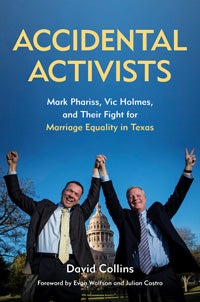Finding Your Inner Activist
An author gives the inside story on the writing of his new book.
By David Collins ’67, M.S. ’69
 In the summer of 2013 Mark Phariss and Vic Holmes contemplated joining a lawsuit challenging statutory and constitutional laws prohibiting same-sex marriage in their home state. The Supreme Court’s decision in United States v. Windsor had opened the door to marriage equality. Someone, they knew, needed to take the lead in Texas. But friends and relatives, aware of very real dangers, urged caution.
In the summer of 2013 Mark Phariss and Vic Holmes contemplated joining a lawsuit challenging statutory and constitutional laws prohibiting same-sex marriage in their home state. The Supreme Court’s decision in United States v. Windsor had opened the door to marriage equality. Someone, they knew, needed to take the lead in Texas. But friends and relatives, aware of very real dangers, urged caution.
Phariss was not “out” at work, and was afraid he and Holmes would be hammered by the conservative opposition. “Politics in Texas…it’s a blood sport,” he thought with no little trepidation. “They’ll just make stuff up!”
Holmes was no less concerned. “We weren’t worried that there would be a massive uprising,” he remembers, “that suddenly a horde of people with pitchforks and torches would come tap dancing in our direction. What worried us was that one extremist—that one hard-core nut case who had decided he was going to ‘fix’ all this with his long-shot rifle.”
In the end, though they had imagined a hundred, a thousand reasons to say no, they said yes—and changed the history of Texas.
My involvement in their story began in the fall of 1978 when I walked into a classroom for that “first class of the semester.” Searching the expectant faces for distinguishing marks to help me remember who was who, I found only one that really stood out, a function of his light-skinned, freckled face topped by a shock of red hair. His name was Mark Phariss.
Phariss turned out to be the student every professor dreams of: smart, serious, hard-working yet funny. Semester after semester, we got to know each other well—or so I thought. I learned a great deal about his family, about his life in Oklahoma, about his ambition for a life in the law. I had no idea, however, that he was gay. More important, I had no idea of the difficulties that entailed in 1970s Missouri—flyover country.
That changed in the 20 months it took me to write Accidental Activists. I don’t write sequentially; I bob about, tackle the easier chapters first. I put off until last the early chapter that would tell Phariss’ and Holmes’ stories to the point where they sued Texas.
The problem wasn’t a lack of material. I had boxes of notes from hours and hours of in-person interviews, from phone calls, emails, and text messages. Too much material. The problem was deciding what to leave out, and what to include.
As a straight man setting out to write the story of two gay men, I knew I faced formidable obstacles. To provide context, I’d have to learn more about the history of LGBTQ rights. To write clearly about legal issues in Supreme Court decisions and the hearings in their case, I’d have to learn a whole new language.
But I knew my greatest challenge would be to write in a way that would do justice to the struggle of growing up gay. I wanted readers not just to understand, but to feel the pain inflicted on Phariss and Holmes, and millions more, by straight culture.
In the end I found an effective guide through that troublesome early chapter, a principle of selection that narrowed my choices: focus on incidents that would demonstrate how in their formative years, Mark and Vic had been bombarded by messages from straight America that being gay was wrong, that it would destroy their lives, condemn them to hell—that being gay was dangerous, even life-threatening. Messages that led them for years to deny who they were, to struggle for authenticity and integrity, for dignity.
Accidental Activists is a civil rights story, a story of the voyage of the hero, but most of all it is the story of two men in love, together for 16 years when their case began, who wanted nothing more than what any lovers want: the right to marry, to devote their lives to one another and to be happy together. •
Phariss and Holmes, after two years of tense legal battles and 18 together, were married in 2015, deep in the heart of their home state of Texas. Their friend, author David Collins, holds bachelor’s and master’s degrees from URI, taught English for 40 years at Westminster College in Fulton, Missouri, and has been widely published. He lives in Pineville, North Carolina.
Praise for Accidental Activists: This is the best book on the hugely important topic of gay marriage that I have encountered. The courtroom scenes—beautifully rendered, stirring, enlivened by the novelistic revelation of character—are simply superb and brilliantly handled. I was riveted by the explanations of precedents, accounts of legal tactics, and descriptions of lawyerly performances. Collins movingly captures the two men’s lifelong struggles with shame and self-loathing and, finally, the personal triumph of their confronting the public to claim their right to love in the country they love.
–George Hodgman, author of Bettyville
 Home
Home Browse
Browse Close
Close Events
Events Maps
Maps Email
Email Brightspace
Brightspace eCampus
eCampus


